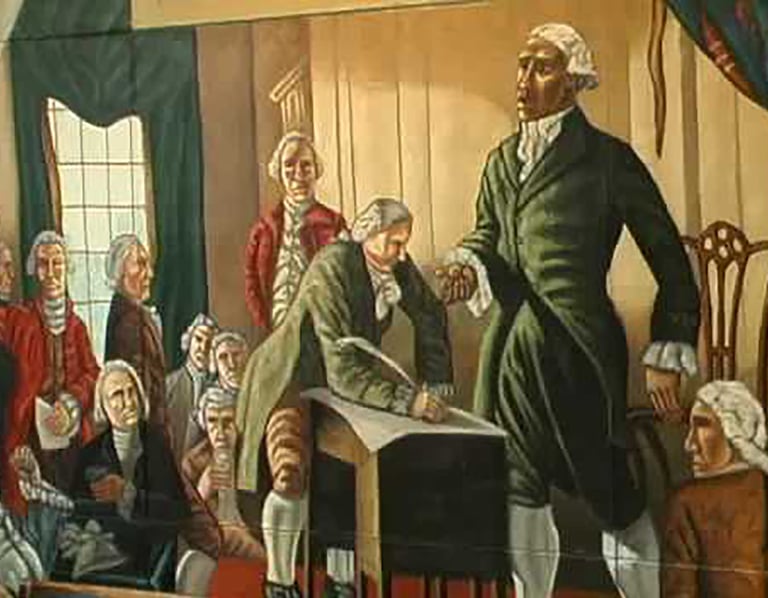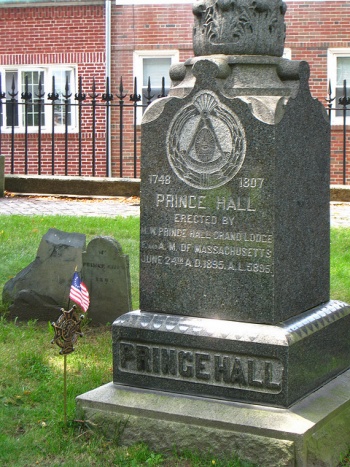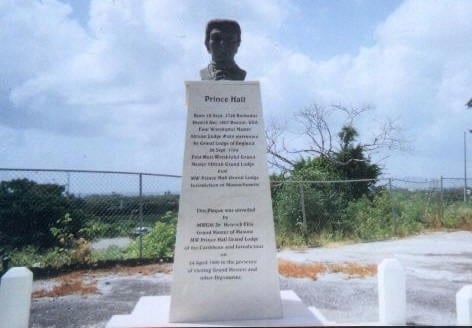Prince Hall...Founder of African American Freemasonry
Prince Hall and fourteen other “men of color” on March 6, 1775 were initiated in a British Army Lodge, No. 441 of the Irish Registry by J. E. Batt, Worshipful Master, on Castle William Island (now Castle Island), in Boston Harbor.
When the British evacuated Boston along with its 38th British Foot and its Lodge #441, Prince Hall was given a “permit” to meet as a Lodge. However, not being a regular lodge, they were not allowed to make any new Masons. Their charge was to only “meet as a Lodge and to bury their dead in manner and in form.” Under it African Lodge # 1 was organized on July 3, 1776 with Prince Hall as the Worshipful Master. Later (December 1782) Provincial Grand Master John Rowe gave them a permit to “walk on St. John’s Day.” Today, we would refer to this as a U.D. (Under Dispensation) lodge. In 1784, Prince Hall petitioned the Grand Lodge of England, the premier (or mother) grand lodge of the world, for a warrant, or charter, to become a “regular masonic lodge.”
On September 29, 1784, the Grand Lodge of England granted a charter to Prince Hall and his associates for African Lodge #459. They formally began work as a “regular” Masonic lodge on May 6, 1787, “with all the rights and privileges” of any Masonic lodge in the world.
Since African Lodge #459 was the only lodge in America to receive her charter directly from England, a close relationship developed between Prince Hall and the Grand Lodge of England. In 1791, he was appointed a Provincial Grand Master, and African Lodge #459 became a “mother” lodge. In 1797 Prince Hall organized lodges in Pennsylvania and Rhode Island under the #459 Charter, and the march of Prince Hall lodges had begun. Today there are over 5,000 Prince Hall lodges with forty-seven grand lodges who can trace their origin to African Lodge #459, Boston, Mass. In these organizations are over 300,000 Master Masons. There are also adoptive, appendant and affiliated bodies including all houses in the Scottish Rite, the York Rite, the Order of the Eastern Star and the Shriners.
Prince Hall died on December 4, 1807, after serving thirty-one years as Worshipful Master of African Lodge. One year later (December, 1808) the brethren of the African Lodges of Massachusetts, Pennsylvania and Rhode Island, in a General Assembly of the Craft held in Boston, organized African Grand Lodge with Most Worshipful Brother Nero Prince as the Grand Master.
In memory and out of respect of Most Worshipful Brother Prince Hall, African Grand Lodge changed its name to Prince Hall Grand Lodge, Jurisdiction of Massachusetts, in 1847 and soon after formed its first three Massachusetts lodges since African Lodge was formed in 1776: Union #2 (February 11, 1848), Rising Sons of St. John #3 (February 17, 1848) and Celestial #4 (April 24, 1848).
The significance of the “regular” organizing of African Lodge #459 is evidenced today by the Grand Lodge of England adding African Lodge #459 to the legal origins of grand lodges seeking recognition. Previously a grand lodge had to trace its lineage to the Grand Lodges of England, Scotland or Ireland. Now England had added African Lodge #459 to that mix.
Prince Hall, Our Masonic Father
A quote from one of Prince Hall’s Charges to African Lodge will give you an idea of the conditions he was trying to improve:
Patients, I say, because if we were not possessed of a great measure of it you could not bear up under the daily insults you meet within the streets of Boston; much more on public days of recreation, how you are shamefully abused and at such a degree that you may truly be said to carry your lives in your hands, and the arrows of death are flying about your heads; helpless old women have their clothes torn off their backs, even to exposing their nakedness.
A quote from another Charge:
Live and act as Masons, that you may die as Masons; let those despisers see, although many of us cannot read, yet by our searches and researches into men and things, we have supplied that defect; and if they will let us call ourselves a chartered lodge of just and lawful Masons; be always ready to give an answer to those that ask you a question; give the right hand of affection and fellowship to whom it justly belongs; let their colour and complexion be what it will, let their nation be what it may, for they are your brethren, and it is your indispensable duty so to do…
It might seem that Prince Hall was engaging in political and community activities that had no Masonic relevance. However, taken in the context of that time, we can see that his actions were akin to other Masonic leaders.
Does anyone argue with the involvement of Benjamin Franklin, Paul Revere or George Washington in the politics of the day? Does anyone argue with St. John”s Lodge of Boston for their involvement in the Boston Tea Party (even though it was during the time of refreshment at their regular lodge meeting)?





